Veranstaltungen und Aktivitäten
DIJ Newsletter Autumn 2022
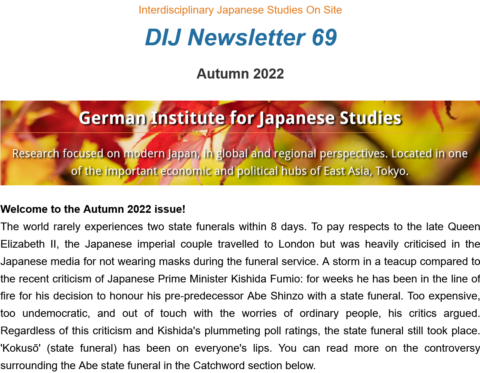
The autumn issue of our DIJ Newsletter provides up-to-date insights into our research and publication activities, recent and upcoming events, news from the institute, a new article in our Catchword series (kokusō), updates on our outreach activities, and DIJ alumni news. We hope you will enjoy exploring this new edition of the DIJ Newsletter. If you haven’t done so yet, you can subscribe to receive our Newsletters directly to your inbox. The full issues and subscription form are available here.
International Workshop The Intimate in and beyond Pandemic Times
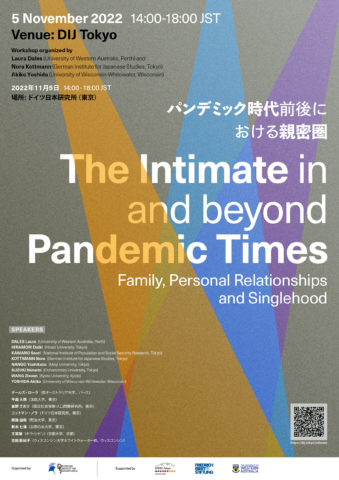
Three years into the COVID-19 pandemic, it is clear that the virus and its political, economic, and public health implications have led to profound, if uneven, effects on human society. The restrictions imposed by political and public health responses to COVID have curbed social interactions, limited physical movement, and challenged the functions and experiences of the home as a space of comfort and site of intimacy. On November 5, the DIJ will host the international workshop The Intimate in and beyond Pandemic Times: Family, Personal Relationships and Singlehood to discuss multi-dimensional effects of the pandemic and its global and local influences on the intimate. Its speakers will introduce results of a large-scale survey conducted in January 2021 and address stay-at-home policies, teleworking, domestic violence, personal space, cohabitation among same-sex couples, and (solo)sociality. The workshop is organised by DIJ social scientist Nora Kottmann, Akiko Yoshida (University of Wisconsin-Whitewater, Wisconsin and Scholar in Residence, DIJ Tokyo), and Laura Dales (University of Western Australia). Registration and details here
Joint book exhibition on Ryukyu and Okinawa
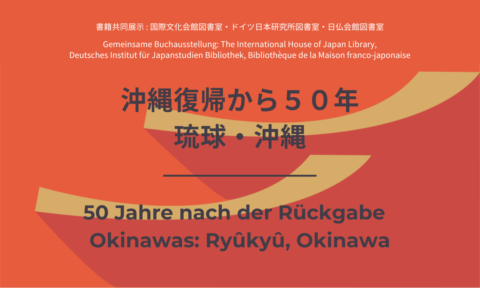
This year marks the 50th anniversary of Okinawa’s return to the mainland on 15 May 1972. In the special exhibition ‚Ryukyu/Okinawa: 50 years since the reversion of Okinawa‘, the libraries of the International House of Japan, the Maison franco-japonaise, and the DIJ exhibit research books and articles on the history and culture of Ryukyu and Okinawa written in English, German, and French. The exhibition at the DIJ is open to the public from 4 October to 30 November. For more information on opening times and entry regulations, please contact our library. Details here
New Working Paper studies East and Southeast Asian perspectives on Russia’s war on Ukraine
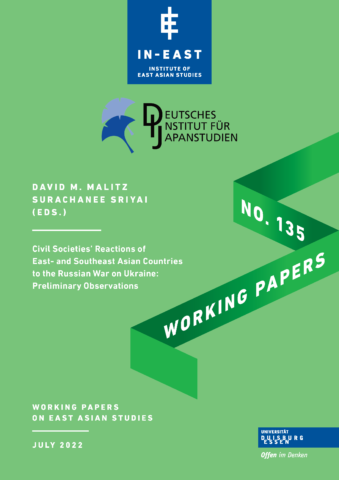
How have societies in East and Southeast Asia reacted to Russia’s invasion of Ukraine? This open access collection of essays provides preliminary answers from Japan, Thailand, the Philippines, South Korea, Indonesia, Malaysia, Myanmar, and ASEAN. Focusing on press and social media, they reveal that the responses to the war are heterogeneous and may not always agree with the foreign policy stances by the respective governments. The essays are published as Working Paper No. 135 in the East Asian Studies series (Institute of East Asian Studies, University of Duisburg-Essen), edited by DIJ’s David M. Malitz and Surachanee Sriyai (Chulalongkorn University, Bangkok). David’s own paper („Strong Public Support for the Japanese Responses to the Russian Invasion of Ukraine“) outlines the Japanese government’s economic sanctions, delivery of equipment to Ukraine, and acceptance of Ukrainian refugees. Against the background of the strained Japanese-Russian relations, it explains why the public in Japan has been supportive of Ukraine and of these responses by the government.
New article on romantic and familial relationships in Japanese TV dramas
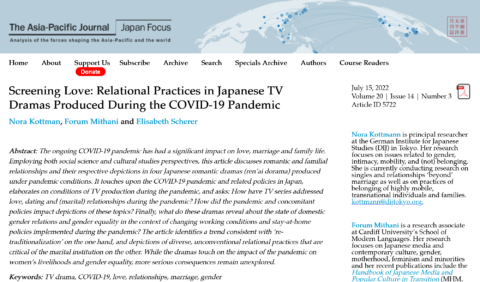
The ongoing COVID-19 pandemic has had a significant impact on love, marriage, and family life. Employing both social science and cultural studies perspectives, this new article by DIJ social scientist Nora Kottmann, Forum Mithani, and DIJ alumna Elisabeth Scherer discusses romantic and familial relationships and their respective depictions in four Japanese romantic dramas (ren’ai dorama) produced under pandemic conditions. The article touches upon the COVID-19 pandemic and related policies in Japan, elaborates on conditions of TV production during the pandemic, and asks: How have TV series addressed love, dating and (marital) relationships during the pandemic? „Screening Love: Relational practices in Japanese TV dramas produced during the COVID-19 pandemic“ (Japan Focus: The Asia-Pacific Journal 20 (14/3): 1–21) identifies a trend consistent with ‚re-traditionalization‘ on the one hand, and depictions of diverse, unconventional relational practices that are critical of the marital institution on the other. It is available open access.
Nora Kottmann chairs panel on „Diversity in Science“

DIJ principal researcher Nora Kottmann will chair the panel discussion „Diversity in Science – How to Promote Inclusion & Empowerment in Japan“ on October 19, online and at the OAG Hall in Tokyo. The event starts with a keynote speech by former DIJ advisory board member Kaori Hayashi (University of Tokyo) on turning her university into a global university. The panelists will then discuss how Japan can meet the challenges it faces when it comes to diversity: engaging people from different backgrounds (age, gender, nationality); making scientific careers more attractive for young researchers; attracting more international students again after the country’s closure during the pandemic. The event is jointly organised by the German Centre for Research and Innovation Tokyo (DWIH Tokyo) and the German East Asiatic Society (OAG). Details here
Axel Klein to discuss political populism in Japan in hybrid DIJ Study Group

Compared to other liberal democracies, Japan’s political system has a few rare characteristics, including the dominance of a single political party and the absence of an electorally relevant green party. But what about populism? Are there populist parties or populist politicians? The few studies that deal with this question have identified Ishin no Kai (Japan Restoration Party), Tomin Fāsuto (Citizens of Tokyo First), Koizumi Jun’ichirō, Hashimoto Tōru, Koike Yuriko, and Yamamoto Tarō (Reiwa Shinsengumi) as the usual suspects. This presentation will introduce the Japan track of a larger project presently underway at the University of Duisburg-Essen entitled “Populism in East Asian Democracies”. DIJ alumnus Axel Klein will address the questions above and explain his view on why there may be smoke without a fire when it comes to populism in Japan. Details and registration here
Axel Klein, University of Duisburg-Essen (Germany)
DIJ researchers at Nichibunken Seminar on Japanese Studies
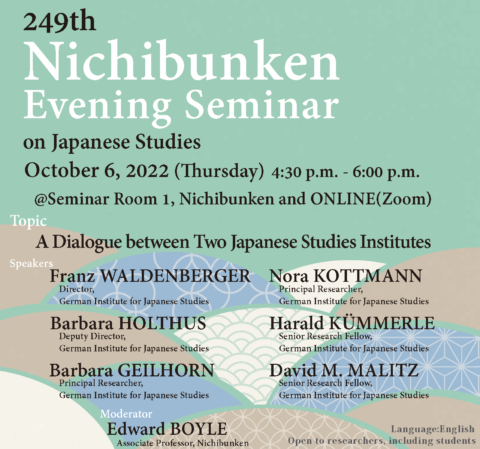
To commemorate the new academic exchange agreement between the DIJ and the International Research Center for Japanese Studies (Nichibunken), researchers from both institutes will discuss the state and future of research in Japanese Studies at the 249th Nichibunken Evening Seminar on October 6. They will discuss Japan as a research object from Japanese and foreign perspectives and address the challenges for international Japanese Studies. The DIJ delegation will include director Franz Waldenberger, deputy director Barbara Holthus, research fellows Barbara Geilhorn, Nora Kottmann, Harald Kümmerle, and David M. Malitz. The seminar will be held in hybrid format at the Nichibunken in Kyoto and online (Zoom). It will be moderated by Edward Boyle, Associate Professor at the International Research Center for Japanese Studies. Details and registration here

















 Open Access
Open Access 
